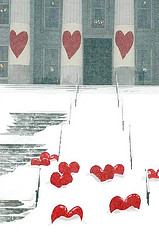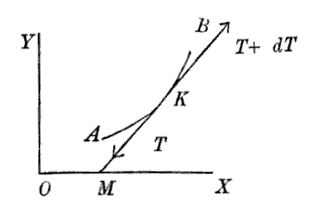Byron wasn’t shy with his political opinions — he proposed this epitaph for Lord Castlereagh, who died in 1822:
Posterity will ne’er survey
A nobler grave than this:
Here lie the bones of Castlereagh:
Stop, traveller, and piss.
Byron wasn’t shy with his political opinions — he proposed this epitaph for Lord Castlereagh, who died in 1822:
Posterity will ne’er survey
A nobler grave than this:
Here lie the bones of Castlereagh:
Stop, traveller, and piss.

In 1945, Dutch designer Arnold Henske realized that his body was “invulnerable” and took to swallowing glass and razor blades as a fakir in Amsterdam.
That’s a real rapier transfixing his thorax at left.
His dream was to use his ability to spread a message of love and peace, but Dutch officials would license him only to perform his act, not to preach against materialism, as he’d hoped.
A voice told him to swallow a steel needle in 1948, and he died of an aortic rupture — a broken heart.
At a desert oasis, A and B decide independently to murder C. A poisons C’s canteen, and later B punches a hole in it. C dies of thirst. Who killed him?
A argues that C never drank the poison. B claims that he only deprived C of poisoned water. They’re both right, but still C is dead. Who’s guilty?
Distances to which objects were carried by the tornado at Mount Carmel, Ill., June 4, 1877:
A letter from Mount Carmel was found at Vincennes, Ind., twenty-five miles northeastward. A piece of tin roofing was picked up near Hazleton, Ind., seventeen miles northeastward. The spire, vane, and gilded ball of the Methodist church were found near Decker’s Station, Ind., fifteen miles northeastward. A letter from Mount Carmel was carried by the wind to Widner Township, Ind., forty-five miles north-northeastward. A discharge from the military service of the United States belonging to a Mount Carmel man was found near Edwardsport, Ind., nearly fifty miles northeastward, and a letter from Mount Carmel was found near the same place. … I was also told that a paper sack of flour from a demolished store was found nearly five miles distant in Indiana, with no further damage than a small hole in it.
From the Annual Report of the Secretary of War, 1877.
“Age is a high price to pay for maturity.” — Tom Stoppard
In September 1931, the Irving family claimed to hear a scratching behind the walls of their farmhouse on the Isle of Man. That seemed mundane enough until the scratcher revealed itself as Gef, a 79-year-old talking mongoose from New Delhi. Over the next four years, James Irving kept a journal recording the family’s bizarre interactions with the creature, which he said threw objects, boasted about its powers, and gossiped about the neighbors.
Investigations went nowhere, as Gef appeared and spoke only to the Irvings. A hair sample and tooth impressions suggested only a dog; a set of pawprints were found not to be those of a mongoose.
It’s hard to credit such an outlandish story, but it’s equally hard to see why anyone would invent it. The Irvings profited nothing by it and were widely ridiculed in the media; when the family finally sold the house in 1937, they lost money, as it was now reputed to be haunted.
In 1947, the new owner claimed to have discovered and shot a real mongoose on the property. You don’t suppose … ?

Each year, in the early hours of Valentine’s Day, someone scatters red hearts through downtown Montpelier, Vt.
When they first appeared, in 2002, they were simple photocopies, but by 2006 large banners were gracing the State House columns. Soon the decorations spread to the high school’s chimney and a tower at the Vermont College of Fine Arts.
“Currently, there are no leads and no suspects,” joked police chief Dave Janawicz in 2007, when 14 inches of snow failed to stop the bandit. “But the investigation continues.”
Vermont’s capital is not alone in this — for years, the same thing has been happening in Portland, Maine, and in Boulder, Colo. No one knows who does it or why.
A similar phantom visits the grave of Edgar Allan Poe each year on the poet’s birthday.
This excerpt from Coriolanus contains every letter of the alphabet but Z:
O, a kiss
Long as my exile, sweet as my revenge!
Now, by the jealous queen of heaven, that kiss
I carried from thee, dear; and my true lip
Hath virgin’d it e’er since.
This one, from Milton’s Paradise Lost (from the Z in grazed to the b in Both), contains all of them:
Likening his Maker to the grazed ox,
Jehovah, who, in one night, when he passed
From Egypt marching, equalled with one stroke
Both her first-born and all her bleating gods.
See Quick Brown Fox, A Biblical Pangram, A Pangrammatic Highway, and Nevermore.

When he wasn’t taming electromagnetism, James Clerk Maxwell wrote verse. Here’s “A Problem in Dynamics,” composed in 1854:
An inextensible heavy chain
Lies on a smooth horizontal plane,
An impulsive force is applied at A,
Required the initial motion of K.
Let ds be the infinitesimal link,
Of which for the present we’ve only to think;
Let T be the tension, and T + dT
The same for the end that is nearest to B.
Let a be put, by a common convention,
For the angle at M ‘twixt OX and the tension;
Let Vt and Vn be ds‘s velocities,
Of which Vt along and Vn across it is;
Then Vn/Vt the tangent will equal,
Of the angle of starting worked out in the sequel.
In working the problem the first thing of course is
To equate the impressed and effectual forces.
K is tugged by two tensions, whose difference dT
Must equal the element’s mass into Vt.
Vn must be due to the force perpendicular
To ds‘s direction, which shows the particular
Advantage of using da to serve at your
Pleasure to estimate ds‘s curvature.
For Vn into mass of a unit of chain
Must equal the curvature into the strain.
Thus managing cause and effect to discriminate,
The student must fruitlessly try to eliminate,
And painfully learn, that in order to do it, he
Must find the Equation of Continuity.
The reason is this, that the tough little element,
Which the force of impulsion to beat to a jelly meant,
Was endowed with a property incomprehensible,
And was “given,” in the language of Shop, “inextensible.”
It therefore with such pertinacity odd defied
The force which the length of the chain should have modified,
That its stubborn example may possibly yet recall
These overgrown rhymes to their prosody metrical.
The condition is got by resolving again,
According to axes assumed in the plane.
If then you reduce to the tangent and normal,
You will find the equation more neat tho’ less formal.
The condition thus found after these preparations,
When duly combined with the former equations,
Will give you another, in which differentials
(When the chain forms a circle), become in essentials
No harder than those that we easily solve
In the time a T totum would take to revolve.
Now joyfully leaving ds to itself, a-
Ttend to the values of T and of a.
The chain undergoes a distorting convulsion,
Produced first at A by the force of impulsion.
In magnitude R, in direction tangential,
Equating this R to the form exponential,
Obtained for the tension when a is zero,
It will measure the tug, such a tug as the “hero
Plume-waving” experienced, tied to the chariot.
But when dragged by the heels his grim head could not carry aught,
So give a its due at the end of the chain,
And the tension ought there to be zero again.
From these two conditions we get three equations,
Which serve to determine the proper relations
Between the first impulse and each coefficient
In the form for the tension, and this is sufficient
To work out the problem, and then, if you choose,
You may turn it and twist it the Dons to amuse.
You’re a knight in love with a princess. Unfortunately, the king knows you’re poor and disapproves of the match.
On the night of a great feast, the king calls you up before his men and presents a golden box. In it are two folded slips of paper. One, he announces, reads “Marriage,” the other “Death.” “Choose one,” he says.
Pretending to stir the fire, the princess manages to whisper that both slips say “Death.” But the king and his men are waiting, and you cannot escape now.
What should you do?